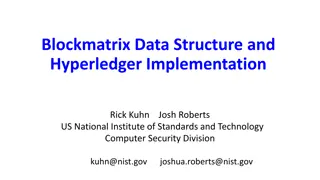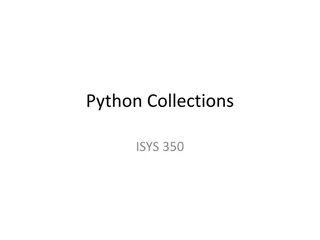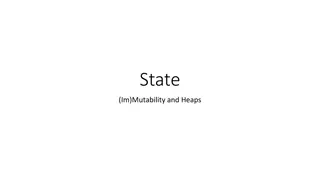Understanding Strings in Python Programming
Strings in Python are sequences of characters with various operations like initialization, accessing, traversal, slicing, and mutability. Learn about basic concepts, such as string initialization using quotes, accessing individual characters, determining string length, traversing strings, slicing su
0 views • 20 slides
Understanding Blockchain Data Structures and Hyperledger Implementation
Blockchain technology offers valuable properties but faces challenges with privacy and data deletion. Blockmatrix, a data structure, provides integrity protection with controlled edits, making it a viable solution for distributed database applications. This summary highlights the conflict between bl
0 views • 33 slides
Understanding Python Collections: Lists, Tuples, and Dictionaries
Data structures in Python such as lists, tuples, and dictionaries play a crucial role in storing and organizing data. Lists allow storing a collection of diverse data items, tuples provide immutability, and dictionaries facilitate key-value pair storage. Learn how to declare, initialize, access, and
0 views • 42 slides
Fides: A System for Verifiable Computation Using Smart Contracts
Fides presents a system for verifiable computation using smart contracts, focusing on blockchain basics, Ethereum, smart contracts, and outsourcing computation. It explores key components of blockchain, Ethereum's decentralized computing platform, properties of smart contracts, and the concept of ve
0 views • 25 slides
Exploring the Role of Blockchain as a Trusted Third Party in Decentralized Systems
Blockchain technology serves as a decentralized and cryptographic Trusted Third Party (TTP) by enhancing trust, immutability, and censorship resistance in transactions. By distributing trust and utilizing cryptographic protocols, blockchain mitigates the need for a centralized authority, offering a
0 views • 30 slides
Understanding the Intersection of Blockchains and GDPR
Exploring key concepts like data minimization, mutability vs. immutability, erasure, accountability, and responsibility in the context of GDPR regulations and how they relate to blockchains. The article delves into aspects such as personal data relevance, rectification rights, the right to be forgot
0 views • 12 slides
Understanding State, Mutability, and Heaps in Programming
Explore the concepts of (im)mutability, imperative vs. functional programming, referential transparency, and challenges for strict immutability in programming. Learn about the differences between imperative and functional languages, the benefits of referential transparency, and the challenges of mai
0 views • 46 slides






